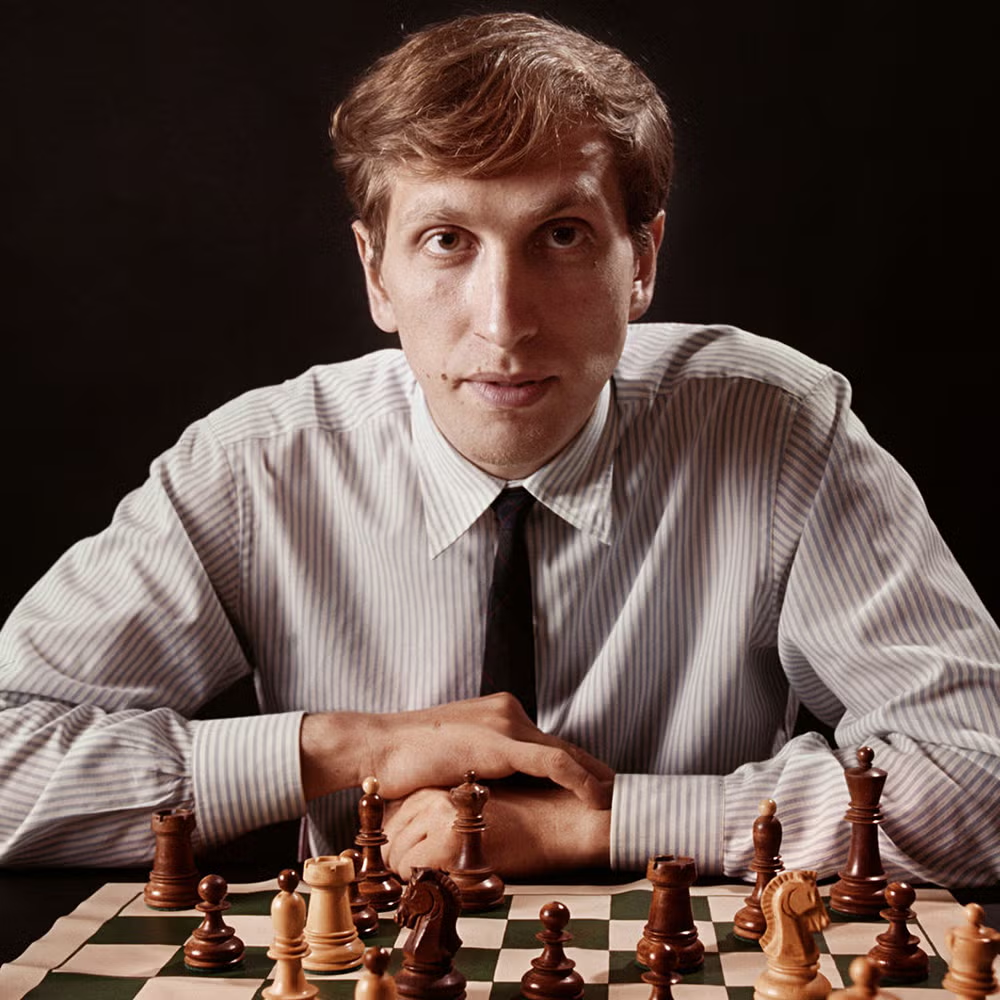
Table of Contents
Who Was Bobby Fischer?
Bobby Fischer, a prodigious chess player, first encountered the game at the age of six and went on to become the youngest international grandmaster at 15. Renowned for his exceptional intelligence, Fischer reportedly had an IQ of 181. In 1972, he made history by becoming the first American-born World Chess Champion, defeating Boris Spassky in a highly publicized match. Known for his eccentric personality and controversial statements in later years, Fischer also became a naturalized Icelandic citizen in 2005 following legal issues with the United States.
Early Life
Robert James Fischer was born on March 9, 1943, in Chicago, Illinois. Fischer’s parents divorced when he was very young, and he was raised primarily by his mother. His chess journey began at age six when his older sister, Joan, gifted him a chess set. Fischer refined his skills at the Brooklyn Chess Club and the Manhattan Chess Club, where his competitive nature flourished. Despite his mother’s support for his chess pursuits, she often encouraged him to explore other interests. Fischer’s dedication to the game paid off when, at age 14, he became the youngest player ever to win the U.S. Chess Championship. In 1958, at the age of 15, he cemented his place in history by becoming the youngest international grandmaster, a feat he achieved after securing sixth place at a tournament in Portoroz, Yugoslavia (now Slovenia).
The Match of the Century
By the early 1960s, Fischer was already a prominent figure in U.S. and world chess competitions, though his growing notoriety was also marked by erratic and often paranoid commentary. Fischer’s extraordinary winning streak in the early 1970s culminated in his iconic 1972 victory over Boris Spassky in Reykjavik, Iceland, at the World Chess Championship. This victory, known as the “Match of the Century,” was a landmark moment in the Cold War era, symbolizing a victory for democracy over Communism. Fischer’s win also contributed to the surge of chess’s popularity in the United States, solidifying his legacy as one of the greatest chess players in history.
Controversial Figure
Bobby Fischer, despite his global fame as a chess prodigy, remained a highly controversial figure throughout much of his life. In the mid-1970s, Fischer famously refused to defend his World Chess Championship title against Anatoly Karpov, the challenger, citing disagreements with the conditions set by the International Chess Federation (FIDE). As a result, Fischer was stripped of his title. During this period, Fischer’s personal life also began to unravel. He reportedly spent time homeless in the Los Angeles area and became associated with a fringe church. In addition to his personal struggles, Fischer became infamous for making anti-Semitic remarks, despite his Jewish heritage through his mother.
In 1992, Fischer made headlines once again when he participated in a rematch against Boris Spassky, 20 years after their historic 1972 World Championship match. This time, the rematch was held in Yugoslavia, with a $5 million prize fund. However, American citizens were prohibited from traveling to Yugoslavia at the time due to U.S. sanctions, making Fischer’s participation illegal. Fischer continued to live abroad to avoid facing criminal charges in the U.S., during which time his controversial statements persisted, including a radio broadcast in which he celebrated the 9/11 attacks on the World Trade Center.
In July 2004, Fischer was detained at a Japanese airport for attempting to leave the country with an invalid passport. He was imprisoned for several months before being granted citizenship by Iceland, where he relocated in 2005.
Death
Fischer passed away on January 17, 2008, in Reykjavík, Iceland, from kidney failure.
Personal Life
Fischer’s personal life was also marked by ambiguity and controversy. In 2004, Miyoko Watai, a Japanese women’s chess champion and the general secretary of the Japanese Chess Federation, claimed to have married Fischer. However, the validity of their marriage was widely questioned. Additionally, another woman claimed to have had a daughter with Fischer, but DNA testing later disproved the paternity claim. In 2011, an Icelandic court ruled that Watai was Fischer’s widow and the sole heir to his estate.
Books and Films on Fischer’s Life
Fischer’s life and career have been the subject of numerous books and films. Fischer himself authored notable works such as Bobby Fischer Teaches Chess (1966) and My 60 Memorable Games (1969). Biographies on Fischer include Endgame: Bobby Fischer’s Remarkable Rise and Fall by Frank Brady, Fischer’s childhood friend, published in 2011.
The documentary Bobby Fischer Against the World (2011), directed by Liz Garbus, explores Fischer’s life and turbulent career. In 2014, the film Pawn Sacrifice, directed by Edward Zwick, focused on Fischer’s psychological struggles and his infamous chess matches, with Tobey Maguire portraying Fischer and Liev Schreiber playing Spassky. The film premiered at the Toronto International Film Festival and was released in U.S. theaters in 2015.
